#Muhsin Al-Ramli
Explore tagged Tumblr posts
Text
Recommendations: On the New Wave of Memoirs from Iraq
Editor’s note: Publishers who are interested in Iraqi literatures will find more in our May Publishers Newsletter, out on May 15. By Hend Saeed In recent decades, memoir has burgeoned in prominence and popularity among Iraqi writers and readers. As acclaimed author-translator Falah Raheem tells us: “Autobiography is one of the most prolific genres in present day Iraq. Needless to say, Iraq has…

View On WordPress
#Ata Abdulwahab#Balkis Sharara#Diaa Khudair#Gardens of Faces#Inaam Kachachi#May Muzaffar#Muhsin al-Ramli#Rafa al-Nasiri#Salah Niazi#هكذا مرت الأيام#Widad Al Orfali#حدائق الوجوه#رحلتي إلى الصين#سلالة الطين#سوالف#غصن مُطَعّم بشجرة غريبة
1 note
·
View note
Text
[Book Review] The President’s Garden🦚
🧮 Score: 4.9/5.0
“A Stunning Read” - Newstalk. Indeed, it is.
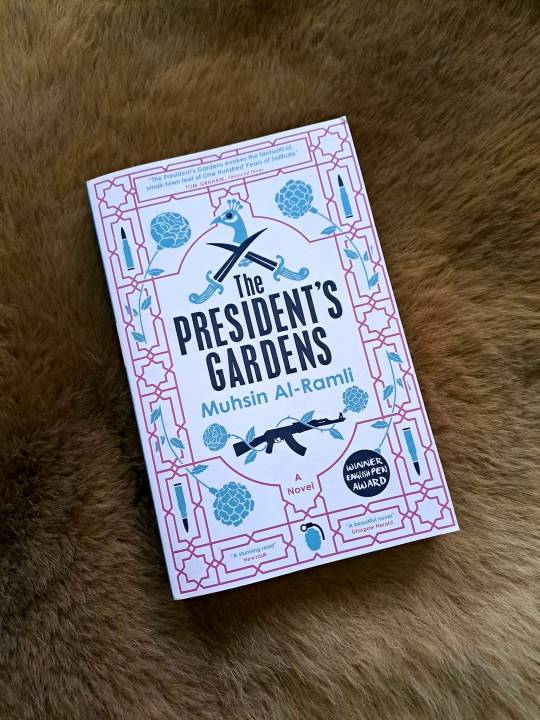
■ If you love the works by Khaled Hosseini, you have to read this book. If you empathise with reading “Burned Alive” and “The Stoning of M. Soraya”, you will appreciate this book.
Love, anger, compassion, cruelty and more, are the flavour of life. This book took you on a journey. A glimpse of all the major events in Iraq and of its people. Of the local family system. Of the society’s hierarchy. Of the wars in the 40s, 60s, early 90s and of the revolution in the early 2000s. These chaotic conditions were the streaming backgrounds of the characters’ lives. The book indirectly highlighted the rumours surrounding crises in the Arab world. .

■ Originally authored in Arabic by Muhsin Al-Ramli, it was well-translated by Luke Leafgren. To me, the narration is flawless. In the first few chapters, it seems like a typical Arabic style of storytelling. As we go on, the content is not all over the place. It is well structured. It is deep, but not too deep. Like the curtains of our sights were lifted one at a time. All the small details meant something.
It is thought-provoking yet, did not burden too much. Borderline is gruesome and not. Slight adult content. Well-balanced emotions-play. Everyone is the protagonist in their own lives. Then, when their lives intertwined with others, it created another main story.
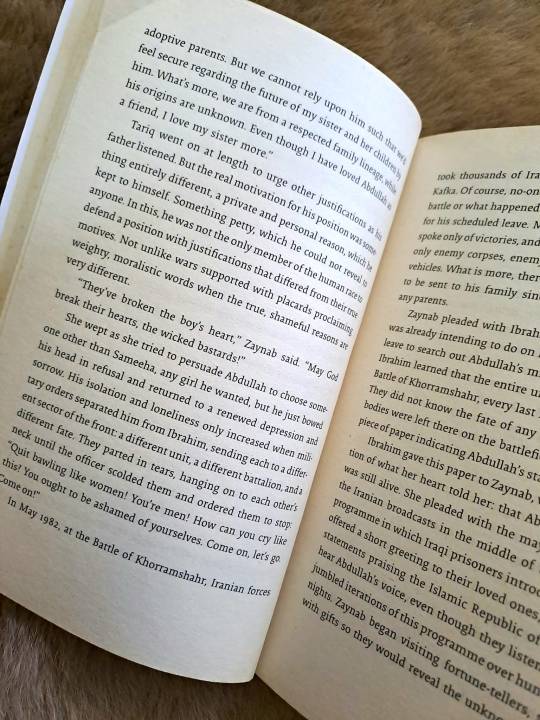
■ It began with the discovery of 9 heads found in a banana crate in a small village away from Baghdad, Iraq. One of the heads belongs to Ibrahim the Fated. And the story revolves around the people close to him during his lifetime.
When the President’s Garden was first revealed, I was still cruising, at best, I suspected a few jump-scares and “over-the-top wealthiness”. After time spent in the garden, never I imagined that I would be as shocked as the character was. Unexpectedly, arriving at that one scene, my jaws literally dropped. I was stunned, that I needed a few moments before resumed my reading. And moving forward, the penmanship never stops to impress us. It is amazing how complex this novel is, yet the author manages to convey them nonchalantly. .

■ Apart from the praise-worthy penmanship, what I like about this book is that, subtly, it calls out the wrongful things people did in the name of religion. Unlike “Burned Alive”, in displaying the barbaric, uncultured, materialistic human nature, this book also clarifies that those actions have nothing to do with Islam.
One more thing, the cover design is brilliant. At one glance, it looks like a typical Middle Eastern art with a peacock and swords to boast one's wealth. When you look again, you will notice more details, the hand grenades, bullets and AK-47. Good colour scheme, too.
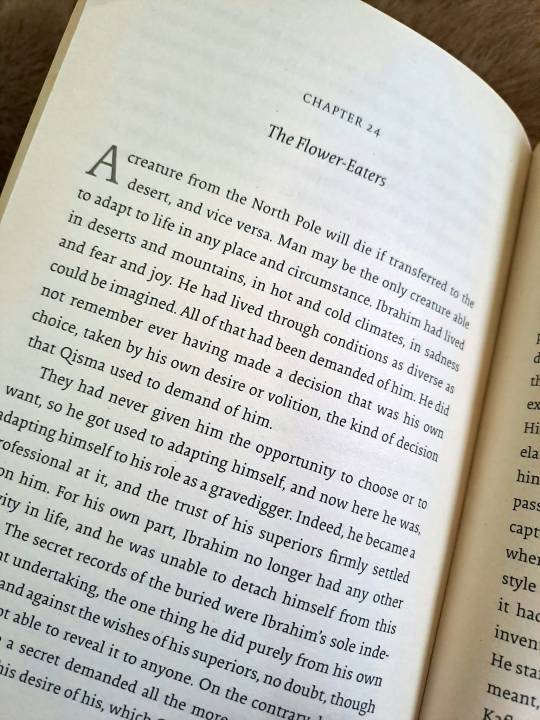
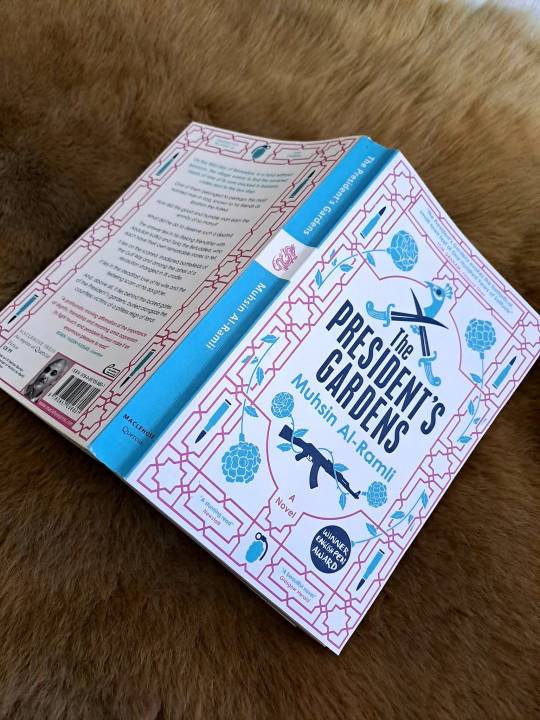
■ The author played with our emotions till the end of the chapter. There is a sequel to this book titled: "Daughter of the Tigris" I do not have it, yet. But I am very much looking forward to it! I know, it will be as good as this one, if not more.
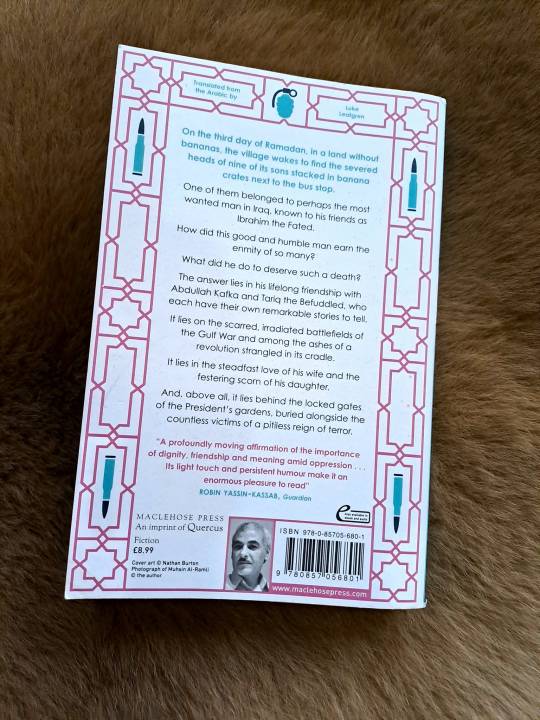
--- ● Get the preloved book on Carousell. . --- *Also read other platforms:
Instagram
Facebook --- ● Follow me on Telegram for quick updates! --
#book review#Muhsin AL Ramli#The President's Garden#Arabic Novel#English Translated#Luke Leafgren#Book Review#Recommended Reading#Preloved Book#Carousell Malaysia
1 note
·
View note
Text
#thisweekthosebooks has Aaron Y. Zelin's insightful study on what the evolution of #Syria's HTS group means for political jihadism, Ulf Laessing's thoughtful exploration of post-Gaddafi #Libya & Muhsin al-Ramli's mordant take on #Iraq under a strongman https://thisweekthosebooks.substack.com/p/syria-first-state-of-chaos-or-cohesion-iraq-libya
0 notes
Text
Reading list Dec 2024
On Killing: The Psychological Cost of Learning to Kill in War and Society by Dave Grossman. It is required reading at the FBI Academy, the DEA Academy, the US Air Force NCO Academy, and other law enforcement agencies and military schools around the US. The book is based on S.L.A. Marshall's theory that the majority of soldiers in war do not ever fire their weapons due to an innate resistance to killing.
Hadji Murad by Leo Tolstoy. One critic said of the book "[it is] my personal touchstone for the sublime of prose fiction, to me the best story in the world." Written 50 years after its events, the story is about a real-life Avar rebel commander. Tolstoy described Murad as "the leading dare-devil and ‘brave’ of all Chechnya".
The Old Words by kvikindi/@septembriseur A Helmut Zemo & Winter Soldier (MCU) fanfic. Content warnings: discussion of violence, suicide, war crimes including death, child death, sexual assault. The author notes she is clear Zemo did not rape, but looking back, that is ridiculous.
Voices from Chernobyl: The Oral History of a Nuclear Disaster by Svetlana Alexievich, Nobel Laureate, originally published in Russian in 1997 as Chernobyl Prayer, 9 years after the disaster. She interviewed more than 500 eyewitnesses, including firefighters, liquidators (members of the cleanup team), politicians, physicians, physicists, and ordinary citizens over a period of 10 years.
Daughter of the Tigris by Muhsin Al-Ramli. A beautiful urbane woman marries a sheikh so she can travel Iraq searching for the corpse of her father. Sequel to The President's Gardens which was longlisted for the IPAF, known as the "Arabic Booker".
Chasing the Flame: One Man's Fight to Save the World by Samantha Power, Pulitzer Prize winner, a biography of Sergio Vieira de Mello. De Mello worked for the UN for 30 years, and was positioned to be the UN Secretary-General, before his 2003 death in Iraq. A profile in courage and humanity--and an unforgettable meditation on how best to manage the deadly challenges of the twenty-first century. His career involved peace negotiations in post-invasion Lebanon, the repatriation of Cambodian refugees, and the cease-fire talks in Bosnia, among others.
Black Like Me by John Howard Griffin. A reporter in 1959 darkens his skin and travels around the American South to document racism. He later worked with Civil Rights leaders like Dr Martin Luther King Jr.
The Women in Black by Madeleine St John. The author has been shortlisted for the Booker Prize. A 'meringue' of a novel about several Australian women working for a department store in 1959 Sydney, contrasted with some Continental (European) refugees. Has a movie and an upcoming TV series.
Lee Lockwood: Castro's Cuba: An American Journalist's Inside Look At Cuba, 1959-1969 by Saul Landau This volume includes Lockwood’s photographs of Cuba and Castro, many insightful observations, and extensive excerpts from the legendary Lockwood-Castro conversations. Between 1959 and 1969, photojournalist Lee Lockwood documented Cuba and Fidel Castro with unprecedented freedom and access, including a marathon seven-day interview with Castro himself.
Daring to Drive by Manal al-Sharif Memoir of a Saudi woman known for leading the #Women2Drive movement challenging the ban on women driving in Saudi Arabia. Also covers other topics including Saudi prisons, female genital mutilation, author's marriage.
Born a Crime: Stories from a South African Childhood by Trevor Noah #1 “Language, even more than color, defines who you are to people.” #2 “The way my mother always explained it, the traditional man wants a woman to be subservient, but he never falls in love with subservient women. He’s attracted to independent women. “He’s like an exotic bird collector,” she said. “He only wants a woman who is free because his dream is to put her in a cage.”
Little Boy Lost by Marghanita Laski Hilary Wainwright, widower, poet, intellectual, returns after the war to a blasted and impoverished France in order to trace a child lost five years before.
A Place of Greater Safety by Hilary Mantel Described by septembriseur as the book that had the most impact on them. Hilary Mantel won the Booker Prize twice.
Sing and Shout: The Mighty Voice of Paul Robeson by Susan Goldman Rubin Biography of a singer, actor, and activist. What I found interesting was his positive attitude of Europe compared to America regarding their treatment of him as a black person.
0 notes
Note
Literally have not found a single good thing to read since the months ago when I revisited The Old Words by kvikindi (author above). I read Patrick Modiano's Scene of the Crime which got me writing, even though it's boring as all heck. I got through it because I was reading it out loud the entire time which somehow makes everything better. My friend is right: humans are designed to speak stories, not read them.
To read: Voices from Chernobyl; short stories of Hassan Blasim and Jamil Jan Kochai; and Hadji Murad. Hopefully they do it.
I have been reading and screenshotting/taking photos of sections of:
Black Like Me by John Howard Griffin
The Sergio Vieira de Mello biography (Chasing the Flame) by Samantha Power (haven't finished reading)
On Killing: The The Psychological Cost of Learning to Kill in War and Society by Dave Grossman (haven't finished reading)
So that when I want to reread them, I can just go through my quotes folders. I recommend all of them.
Anyways, my reply to @septembriseur was:
Looking at my Goodreads: Hadji Murad by Tolstoy's been described before as the best story ever written, so I'm trying that. It's about a Chechen. It sounds like you'd like Daughter of the Tigris, by Muhsin Al-Ramli, with how you like Middle Eastern literature. I'll be rereading it because I don't remember if it was good or really good. I also recommend the nonfiction Voices from Chernobyl by Svetlana Alexievich. (an oral history). Though I can't imagine descriptions as if they're real so it wasn't too depressing for me. The quote I copied to the title page: "We're all peddlers of the apocalypse" "hide from the atom" "the mythology of Chernobyl" "faith in the land, in their ancient peasant experience". And two excerpts: "The only thing I have is a cow. I'd hand her in if only they wouldn't start another war. How I hate war!" &, There was a Ukrainian woman at the market selling big red apples. 'Come get your apples! Chernobyl apples!' Someone told her not to advertise that, no one will buy them. 'Don't worry!' she says. 'They buy them anyway. Some need them for their mother-in-law, some for their boss.'
(Those are some pretty comical excerpts, but there's the expected amount of death and horror.)

what sort of books do you like? Do you have any recommendations?
Hmm. What sort of books do I like. Right now I read essentially two types of book: (1) solid decent crime novels and/or higher-end urban fantasy (Matthew Swift; Felix Castor), which are almost impossible to sort from the floods and floods of garbage that get published; (2) non-fiction. Right now in the second category I’m reading, on and off:
The Makalat of Haji Bektash Veli
On Time: Technology and Temporality in Modern Egypt, by On Barak
Temptations of the West, by Pankaj Mishra
A Map of Longings: The Life and Works of Agha Shahid Ali, by Manan Kapoor
The Dinosaur Artist, by Paige Williams
Someday I might even finish these books. At least I finished Language City.
I am essentially allergic to contemporary Serious Fiction. Like, I kind of want to read Kaveh Akbar’s Martyr!, but my distrust of and disgust for contemporary serious fiction has so far prevented me. Exceptions: I do like Jeff VanderMeer’s Borne, but I’ve hated everything that Jeff VanderMeer has written since. I like the short stories of Hassan Blasim and Jamil Jan Kochai. There’s some less recent stuff that I’ve loved— Hilary Mantel’s A Place of Greater Safety remains the book that’s had the greatest influence on me, and I love it though it has its flaws. Pat Barker’s Regeneration Trilogy— this had its greatest impact on my when I was having serious binocular vision problems and was absorbing all my extramural reading through audiobook, so my memories of it are tied up with the wonderful Peter Firth recording.
There’s probably some stuff I’m forgetting. I don’t know. Poetry would be its own post and I similarly am allergic to most contemporary poetry. I can be more specific if you’re looking for more specific recommendations?
Also, other people should feel free to use this post to recommend stuff to me.
26 notes
·
View notes
Photo
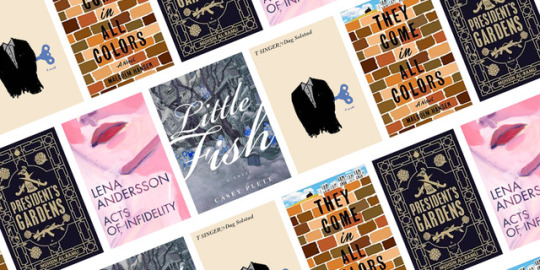
From a tragicomedy from Iraq to a razor-sharp take on being a mistress, from Sweden, 5 great books you may have overlooked last month.
#Muhsin Al-Ramli#The President’s Gardens#Lena Andersson#Acts of Infidelity#Malcolm Hansen#They Come in All Colors#Casey Plett#Little Fish#Dag Solstad#T Singer#Bethanne Patrick
6 notes
·
View notes
Text
Resumen segunda semana de club de lectura con Mus
Resumen segunda semana de club de lectura con Mus. Os dejamos el enlace a las grabaciones y algunos artículos bien curados por @Silvia84 sobre los temas que se abordan en la novela. #LiteraturaÁrabe #ClubDeLecturaSeparataÁrabe
El viernes día 15 de enero tuvimos la segunda sesión del club dedicada a comentar Los jardines del Presidente de Muhsin Al-Ramli, en adelante Mus para nosotros. Continue reading
View On WordPress
0 notes
Text
"Los jardines del presidente", de Muhsin Al-Ramli
“Los jardines del presidente”, de Muhsin Al-Ramli
Muhsin Al-Ramli ganador del English Pen Award «La novela de Muhsin Al-Ramli, ‘Los jardines del presidente’, ofrece una visión increíble de la vida iraquí.» .
«En el tercer día de Ramadán de 2006, en un país sin platanares, los habitantes del pueblo se despertaron con la llegada de nueve cajas para transportar plátanos. En cada una de ellas estaban depositados la cabeza degollada de uno de sus��
View On WordPress
#Alianza Editorial#Íñigo Sánchez-Paños#Colección Alianza Literaria (AL)#Elena M. Cano#Had-a&039;iq ar-ra&039;ays#Los jardines del presidente#Muhsin Al-Ramli#Nehad Bebars#محسن الرملي#حدائق الرئيس
0 notes
Text
Review: The President's Garden by Muhsin Al-Ramli
Review: The President’s Garden by Muhsin Al-Ramli
On the morning of the third day of Ramadan, a village in Iraq wakes to find the heads of nine of its men stacked in banana crates by the bus stop. One of them, known to his friends as Ibrahim the Fated, is one of the most wanted men in Iraq. From the village of his birth through three wars and the lives of his best friends, The President’s Gardenstells the story of how Ibrahim earned the enmity…
View On WordPress
0 notes
Text
SALAFI MASHAYKH
This is a list of SOME (NOT ALL) Salafi scholars and (senior) students of knowledge of this era (a few are dead but the majority are alive today) who resided in Saudi Arabia, Kuwait, Egypt, Yemen, U.A.E., Algeria, Iraq and Jordan.
A handful of the scholars on this list have been refuted by other scholars on the list on particular issues but nothing that takes them out of Salafiyyah to the best of my knowledge.
PLEASE DO NOT MESSAGE ME OR SEND ME ANY REFUTATIONS ETC TO DISSCUSS, AGRUE OR DEBATE WITH ME OVER ANY OF THE MASHAYKH ON THIS LIST BECAUSE YOU HOLD THEY ARE NOT SALAFI.
List Of Contemporary Mashaykh (Divided In To Places Of Residence Of These Mashaykh Not Places Of Birth)
Saudi Arabia
Shaykh Abdul-Azeez Aal Shaykh
Shaykh Abi Abdillah Mahir Bin Dhafer Al-Qahtani
Shaykh Alee Ridaa
Shaykh Abdul-Kareem Al-Khudair
Shaykh Mustafa Mubram
Shaykh Saalih Aal-Taalib
Shaykh Khaalid Al-Ghaamadi
Shaykh Ali Abdur-Rehmaan Al-Huthayfi
Shaykh Salaah Al-Budayr
Shaykh S’ad Naasir Ash-Shithri
Shaykh Saalih Al-Luhaydaan
Shaykh Abdul-‘Azeez Ar-Raajihi
Shaykh Abdur-Rehmaan Al-‘Ajlaan
Shaykh Abdul-Muhsin Al-Abbad
Shaykh Rabee Ibn Haadi Al-Madkhali
Shaykh Saalih Al-Ubood
Shaykh Abdullaah Al-Jarboo
Shaykh Mis’ad Al-Husayni
Shaykh Saalih As-Sindi
Shaykh Ali At-Tuwayjari
Shaykh Ibrahim Ar-Ruhayli
Shaykh Khalid Ar-Raddadi
Shaykh Sulaymaan Ar-Ruhayli
Shaykh Muhammed Al-Hujayli
Shaykh Abdullah Al-Bukhari
Shaykh Saalih As-Suhaymi
Shaykh Wasi-Ullaah Al-‘Abbas
Shaykh Abdur-Rehmaan As-Sudays
Shaykh Ghurmullaah Zahrani
Shaykh Uthmaan Mu’Allaam
Shaykh Muhammed Umar Bazmool
Shaykh Aadel As-Subayee
Shaykh Abdullaah Al-Musallam
Shaykh Fahad Al-Fuhayd
Shaykh Saalih As-Sadlaan
Shaykh Ahmed Al-Munayee
Shaykh Abdul-‘Azeez As-Saeed
Shaykh Muhammed Aadam
Shaykh Salaah Al-Budayr
Shaykh Abdul- Azeez Al-Faalih
Shaykh Salaah Muhammed Aal Shaykh
Shaykh Ahmed Bazmool
Shaykh Abdul Majeed As-Subayyal
Shaykh Muhammed Al-Munayee
Shaykh Abdul Azeez Rayyis
Shaykh Abdullah Al-Ghunaymaan
Shaykh Alee Naasir al-Faqeehee
Shaykh Dr ‘Abdul-‘Aziz al-Sadhan
Shaykh Dr Khalid al-Mushayqih
Shaykh Muhammad al Maliki
Shaykh Muhammad bin ‘Abdul-Wahhaab Al-’Aqeel
Shaykh Saalih Ibn Saalih al-Fawzaan
Shaykh Ubayd Ibn ‘Abdullaah al-Jaabiree
Shaykh ‘Uthmaan Ibn Yahya al-Hamali
Shaykh Abdul-Muhsin Al-Ubaykan
Shaykh Ubaylaan
Shaykh Abdullah Ibn Sulfeeq adh-Dhafiri
Shaykh Muhammad Ibn Haadee al-Madkhalee
Shaykh Fu’ad Ibn Sa’ud al-‘Amri
Shaykh Prof. Asim al-Qaryuti
Shaykh Dr. Adil Muhammad Subay’ee
Shaykh Haythem Sarhaan
Shaykh Abdul Qaadir Ibn Muhammad al-Junaid
Shaykh ‘Adil Mansoor
Shaykh Fawaaz al-Madkhalee
Shaykh Hani Bareek
Shaykh Muhammad Sagheer ‘Akoor al-Madkhalee
Shaykh Muhammad Ibn Ramzaan al-Haajiree
Shaykh Badr Ibn Muhammad al-Badr al-‘Anazy
Shaykh Yahya at-Taaliby
Shaykh ‘Arafat Muhammady
Shaykh Muhammad ‘Awaji al-Muhjari al Madkhalee
Shaykh Hasan Daghriry
Shaykh Usamah Ibn Sa’ud al-‘Amri
Shaykh ‘Abdul’Azeez Ibn Moosaa Ibn Sayr al-Mubaaraky
Shaykh Muhammad Ibn Rabee’ Ibn Haadee al-Madkhalee
Shaykh ‘Awaad Sabty al-‘Anazy
Shaykh Abu ‘Umar Usamah al-‘Utaybi
Shaykh Khalid Namazy
Shaykh Ahmad ‘Aloosh al-Madkhalee
Shaykh ‘Uthmaan al-Mu’alim Somali
Shaykh Saalim Baamihriz Yemeni
Shaykh Doctor ‘Abdur Razzaaq Ibn ‘Abdul Muhsin al-‘Badr
Shaykh Abdul Malik ar-Ramadani
Shaykh Nasir Alaql
Shaykh Saeed Bin Ali Bin Wahf Al-Qahtani
Shaykh Abdur Rahman Muhay Deen
Yemen
Shaykh Abdullah Ibn Naajee al-Hadaad
Shaykh Rashaad al-Hubaishi
Shaykh Abu Amr’ Abdul Kareem Ibn Ahmed Al Hajooree
Shaykh ‘Ali Ibn Naasir Al ‘Adani
Shaykh Abdul-Ghani al-Umaree
Shaykh AbdulHameed al-Hajooree
Shaykh Abu Abdis Salaam Hasan Qaasim Ar Raymee
Shaykh Fath Al-Qadsi
Shaykh Khalid Abdul Rahman Al-Misree
Shaykh Muhammad al-Hakami
Shaykh Muhammad Bin Hizam
Shaykh Abu Abdur Rahman Abdullah Airyaani
Shaykh Salaah Kentush
Shaykh Abu Razzaq Al Nehmee
Shaykh Abdul Rakeeb Al Kawkabanee
Shaykh Muhammad Al Imam
Shaykh Muhammad Ibn ‘Abdul-Wahhaab al-Wassaabee
Shaykh ‘Ali Ibn Ahmad ar-Razihi
Shaykh ‘Abdul ‘Azeez Ibn Yahya al-Bura’ee
Shaykh ‘AbdulGhafoor al‑Lahaji
Shaykh ‘Abdur Rahmaan al-‘Adani
Shaykh Abu ‘Abdullah ‘Uthmaan Ibn ‘Abdullah as-Saalimee
Shaykh Abu Ammaar ‘Ali al-Hudayfee
Shaykh Abu Abdullah Uthmaan Ibn ‘Abdullah as-Saalimee
Shaykh, ‘Ali al-Qaleesee
Shaykh Ahmad Ibn Ahmad Shamlaan
Shaykh Saalim Baamihriz
Shaykh Yahyaa al-Jaabiree
Shaykh ‘Ali Ibn Ahmad ar-Razihi
Shaykh Abu Yahya Zakariyyah al-‘Adani
Shaykh ‘Abdur Rahmaan al-‘Adani
Shaykh Nu’maan al-Watr
Shaykh ‘Abdul Wasee’ as-Sa’eedi
Kuwait
Shaykh Ahmed al-Subai
Shaykh Abdullah Shreikah
Shaykh Faisal al Jaasim
Shaykh Falaah Ismaa’eel al-Mundikaar
Shaykh Falah al-Thani
Shaykh Hai Al Hai
Shaykh Hamd Al Uthman
Shaykh Hamdi Abdul Majeed
Shaykh Hamoud al-Najdi
Shaykh Mohammed al-Anjaree
Shaykh Saalim Taweel
Egypt
Shaykh Muhammad Abdul Wahhaab Al-Banna
Shaykh Khalid Abdul Rahman Al-Misree
Shaykh Khalid Bin Uthmaan
Shaykh Adil As’Sayyid
Shaykh Aadl Shoorbojee
Shaykh Talaat
Shaykh Raslaan
Shaykh Hasan ibn ‘Abdul Wahhab al-Banna
Shaykh Ali al-Waseefi
Shaykh Taamir Fatooh
Jordan
Shaykh Abu Islam
Shaykh Mohammed Musa Nasr
Shaykh Husain al-A’waiyashah
Shaykh Aba al-Hasan ‘Ali Ibn Mukhtar ar-Ramly
Shaykh Mashoor Hasan
Shaykh Sa’ad al-Husayn
U.A.E.
Shaykh Haamid Ibn Khamees al-Junaybi
Shaykh Ahmad Ibn Mubarak al-Mazroo’i
Iraq
Shaykh Mowafaq Hussein al-Jaboory
Shaykh Abu ‘Abdul Haqq ‘Abdul Lateef al-Kurdi
Algeria
Shaykh Azhar Sniqra
Shaykh Muhammad Ferkous
Shaykh Yusuf Al-Jazaa’iree
(A Few Mashaykh Who Died In This Era)
Shaykh Muqbil
Shaykh Uthaymeen
Shaykh Bin Baz
Shaykh Albaani
Shaykh Shaykh Abdus-Salam Bin Burjis
Shaykh Dr Saleh Al-Saleh
Shaykh Muhammad Ibn ‘Abdullaah As-Subayyal
Shaykh Zayd Ibn Haadee al-Madkhalee
Shaykh Abdullah An-Najmee
Shaykh ‘Abdur-Razzaaq Ibn ‘Afeefee
Shaykh Bakar ‘Abdullaah Abu Zayd
Shaykh Abdullaah al-Ghudayyaan
Inshallah this list will get updated from time to time.
13 notes
·
View notes
Text
5 Books: Recommendations from Bothayna al-Essa
5 Books: Recommendations from Bothayna al-Essa
Best-selling and award-winning Kuwaiti novelist Bothayna Al-Essa — also the founder of Takween, a platform for creative writing, a publishing house, and a bookshop — is a voracious reader:
Al-Essa published her first novel (Soundless Collision) at 23, and she has since published more than ten books for adults and children. Her first novel to appear in English translation arrived this spring:…
View On WordPress
#A City of Walls without End#Dalia Tounsi#Faisal al-Habini#he Pigeons’ House#Island of Leaves#Muhsin al-Ramli#Saud Al-Sanousi#Scattered Crumbs#Sons of the End Times#Tariq Imam
0 notes
Text

Book 29, 2019: 'The President's Gardens' by Muhsin Al-Ramli.
Iraq. Village living. City life. Three friends. Family. Secret. Saddam Hussein. Gulf War. Iran. The Invasion. Oppression. Terror. Generational stories.
Weltanschauung!
2 notes
·
View notes
Photo




If you scour the internet for Iraqi novels, you’ll find dozens of lists and list-essays. But these pieces—15 Great Books About Iraq, Afghanistan or The Iraq Novel We’ve Been Waiting For or I’m Not the Enemy or A Reading List of Modern War Stories—give us the perspective of the US soldier, journalist, and aid worker.
What they tell us very little about is Iraq.
Two years after the invasion, in 2005, USA Today reported that more than 300 books had been published in English about the war and ongoing occupation. By now, an Amazon search turns up more than 3,800. A number of them have been critically and commercially successful: American Sniper, The Final Move Beyond Iraq, War Stories, Redeployment, Yellow Birds.
Yet in the first ten years after the invasion, exceptionally few novels by Iraqi authors had been published in English.
That has been changing. This year, we saw the publication of Muhsin al-Ramli’s The President’s Gardens, translated by Luke Leafgren; the sci-fi collection Iraq + 100, edited by Hassan Blasim and Ra Page; and Baghdad Eucharist, by Sinan Antoon, translated by Maia Tabet. There are novels by Iraqi authors now. Here’s some of the best.
https://bookriot.com/2017/11/08/2018-novels-by-iraqi-authors/
42 notes
·
View notes
Text
0 notes
Text
Resumen primera semana y sesión sobre Los jardines del presidente de Muhsin Al-Ramli
Resumen primera semana y sesión sobre Los jardines del presidente de Muhsin Al-Ramli. Para quienes no podéis asistir pero estáis interesados en leer esta obra. @Silvia84 y yo, esperamos que te sea útil. #ClubDeLecturaSeparataÁrabe
Por Silvia R. Taberné y Maribel Glez Martínez El pasado viernes, 8 de enero, tuvimos la primera sesión para comentar e intercambiar impresiones sobre la lectura de Los jardines del Presidente de Muhsin Al-Ramli. La gran sorpresa fue que el mismo autor también participa en estas sesiones. Por eso, si no lo has hecho todavía, te animamos a que te unas a esta aventura. Desde que resultase vencedor…

View On WordPress
0 notes
Text
Gatot Nurmantyo, Din Syamsuddin, Dan Rochmat Wahab Sampaikan Pesan Presidium, Begini Susunan Acara Deklarasi KAMI
Ratusan tokoh akan hadir di acara deklarasi maklumat Koalisi Aksi Menyelamatkan Indonesia (KAMI) di Tugu Proklamasi, Jakarta Pusat pada Selasa (18/8) siang ini. Acara deklarasi maklumat KAMI akan berlangsung pada pukul 10.00 hingga pukul 12.00. Pada acara tersebut, sejumlah tokoh akan membacakan delapan poin maklumat KAMI hingga penyampaian pesan presidium KAMI oleh mantan Panglima TNI, Jenderal (Purn) TNI Gatot Nurmantyo; pemimpin Komite Khittah Nahdlatul Ulama 1926, Prof Rochmat Wahab; dan Ketua Dewan Pertimbangan Majelis Ulama Indonesia (MUI), Din Syamsuddin. Dalam susunan acara yang diterima Kantor Berita Politik RMOL, acara tersebut diawali dengan registrasi peserta dan pemutaran lagu-lagu perjuangan sejak pukul 09.00 hingga 10.00. Selanjutnya pada pukul 10.00, acara dibuka oleh MC, yakni Najamudin Ramli dan Dinda Kartika dan dilanjutkan doa oleh KH Agus Solahul Am Wahib Wahab selalu Sekretaris Jenderal Komite Khittah NU 1926. Kemudian, menyanyikan lagu Indonesia Raya yang dipimpin oleh Prof Sri Edi Swasono sebagai dirigen dengan diiringi paduan suara. Selanjutnya mengheningkan cipta yang dipimpin oleh Bahtiar Chamsyah selaku Ketua Lansia Nasional. Selanjutnya pembacaan Teks Proklamasi yang dipimpin oleh Prof Meutia Farida Hatta Swasono yang merupakan putri proklamator Bung Hatta. Kemudian, pembacaan pembukaan UUD 1945 oleh Sabriati Aziz selaku Presidium Badan Musyawarah Organisasi Wanita Islam; Nur Eko selaku Koordinator BEM Perguruan Tinggi Muhammadiyah se-Indonesia; dan Batara Hutagalung. Selanjutnya pembacaan Teks Pancasila oleh M.S Ka'ban yang diikuti oleh seluruh hadirin. Dan dilanjutkan menyanyikan lagu-lagu perjuangan. Seperti Gebyar-gebyar dan Padamu Negeri oleh paduan suara. Kemudian memasuki acara inti deklarasi KAMI, yakni deklarasi menyelamatkan Indonesia sebagai pertanda pendirian KAMI dengan didahului pembacaan Jatidir KAMI oleh Dr. Ahmad Yani. Selanjutnya, pembacaan maklumat menyelamatkan Indonesia yang dibacakan secara bergantian oleh beberapa tokoh. Diantaranya, Marfuah Mustofa, Raja Samu-samu, Prof Hafid Abbas, Ichsanuddin Noorsy, Lieus Sungkharisma, Nurhayati Assegaf, Chusnul Mariyah, Jumhur Hidayat. Dan Budi Jatmiko, Jeje Jaenuddin, Adhie Massardi, Dian Fatwa, Marwan Batubara, Nanang Mubarok, Abdullah Hehamahua, Said Didu, Ilham Bintang, Refly Harun, Syahganda Nainggolan, Muhsin Al-Attas dan Rocky Gerung. Di akhir acara, tiga tokoh diantaranya yakni Gatot Nurmantyo, Rochmad Wahab dan Din Syamsuddin akan menyampaikan pesan presidium KAMI dan dilanjutkan dengan penutup yang diiringi lagu-lagu kebangsaan. from Blogger https://ift.tt/320Z5Wf via IFTTT
0 notes